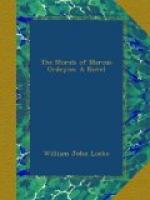The young fellow was he who had pointed me out in Hyde Park to his companion, and lightly assured her that I was as mad as a dingo dog. From the moment after the phrase’s utterance to that of the slapping of my knee, it had been altogether absent from my mind. Now it haunts me. It reiterates itself after the manner of a glib phrase. I am glad I am not in a railway carriage; the cranks would amuse the wheels with it all night long. As it is, the surf tries to thunder it out on the shingle just a few yards away from my window. I keep asking myself: why a dingo dog? If I am mad it is in a gentle, Jaquesian, melancholy manner. I do not dash at life, rabid and foaming at the mouth.
I think the idiot simile must have been merely the misuse of language so common among the half-educated youth of Great Britain.
Yet when I come to consider my present condition, I have doubts as to my complete sanity. Here am I, in a little, semi-fashionable French seaside place, away from my books and my comforts and my habits, as much interested in its vapid distractions as if the universe held no other pursuits worth the attention of a rational man. And I have been here a calendar month.
To please Carlotta I wear white duck trousers, a pink shirt, and a yachting-cap. I wired for them to my London tailor and they arrived within a week. The first time I appeared in the maniacal costume I slunk from the stony stare of a gendarme, as I was about to ascend the Casino steps, and hid myself among the fishing-boats lower down on the beach. Carlotta, however, was delighted and said that I looked pretty. Now I have grown callous, seeing other fools similarly apparelled. But a year ago, should I have dreamed it possible for me to strut about a fashionable plage in white ducks, a pink shirt, and a yachting-cap? I trow not. They are signs of some sort of madness —whether that of a Jaques or a dingo dog matters very little.
Pasquale was the main cause of my taking Carlotta away from London. He came far too frequently to the house, established far too great a familiarity with my little girl. She quoted him far too readily. She is at the impressionable age when young women fall easy victims to the allurements of a fascinating creature like Pasquale. If he showed himself in the light of a possible husband for Carlotta, I should have nothing to say. I should give the pair my paternal benediction. But I know my Renaissance and I know my Pasquale. Carlotta is merely a new sensation—that’s all he seems to live for, the delectable scoundrel. But I am not going to have her heart broken by any cinquecento wolf in Poole’s clothing. I assume that Carlotta has a heart, even if she is not possessed of a soul. As to the latter I am still in doubt. At all events I resolved to withdraw Carlotta from his influence, put her in fresh surroundings, and allow her to mix more freely among men and women, so as to divert and possibly improve her mind.




